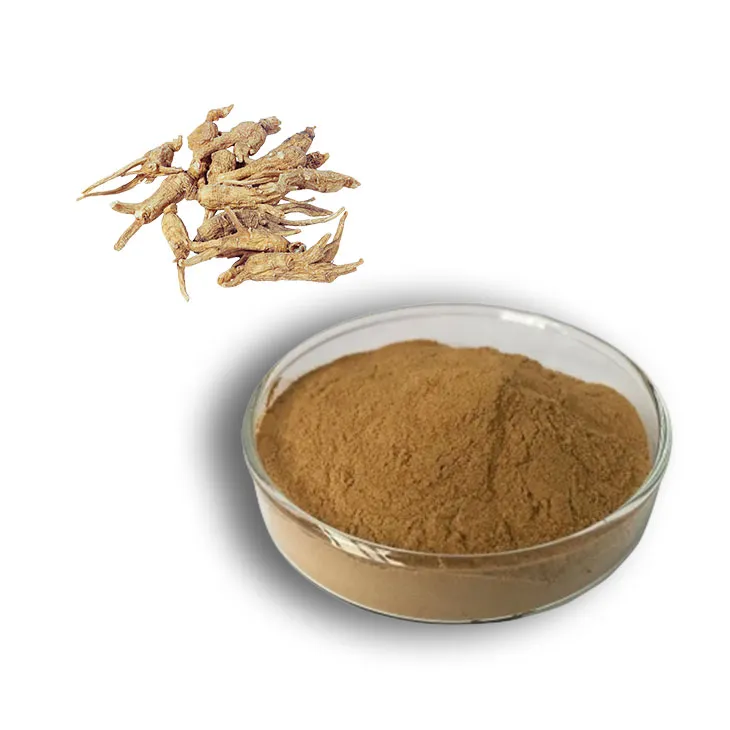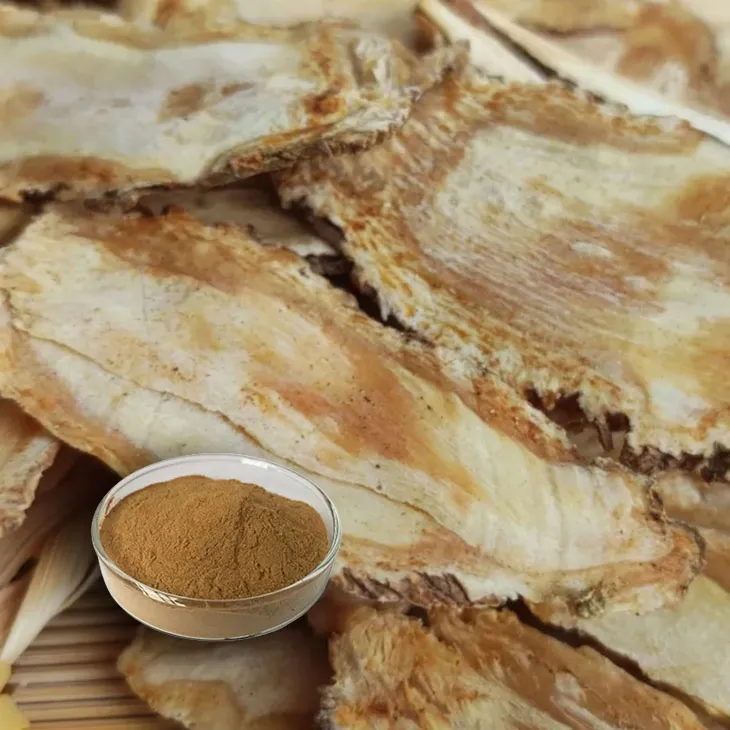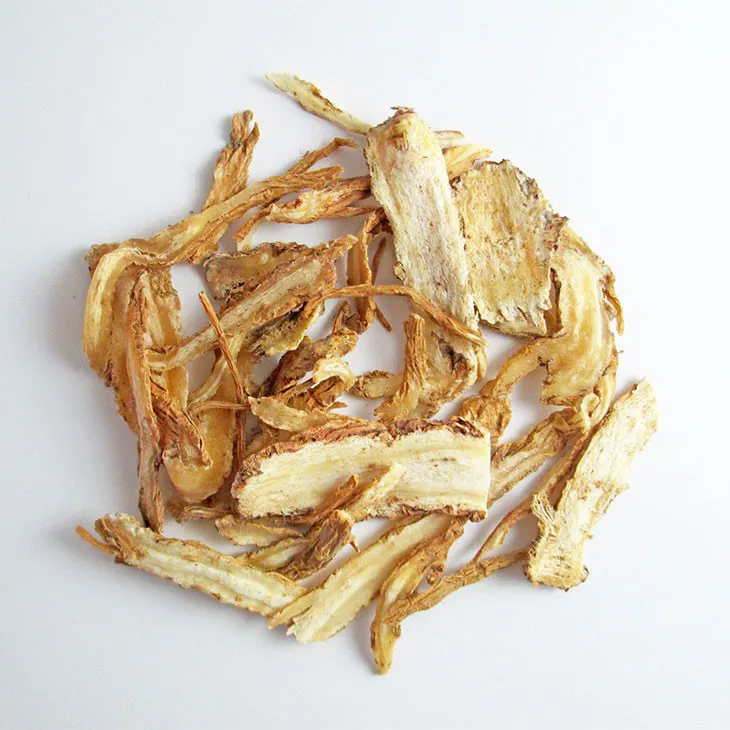- 0086-571-85302990
- sales@greenskybio.com
Benefits of Angelica sinensis Extract in Cattle Feed.
2024-11-14

1. Introduction
In the field of livestock farming, the quality of cattle feed plays a crucial role in determining the health and productivity of cattle. Angelica sinensis extract has emerged as a potential additive in cattle feed, offering a plethora of benefits. This extract, derived from the Angelica sinensis plant, has been traditionally used in herbal medicine in some cultures. In recent years, its application in the animal husbandry sector has been explored, and the results are quite promising.

2. Antioxidant Properties
2.1 Understanding Oxidative Stress in Cattle Cattle, like all living organisms, are constantly exposed to various environmental stressors that can lead to the production of free radicals within their bodies. These free radicals are highly reactive molecules that can cause damage to cells, proteins, and DNA. This phenomenon is known as oxidative stress. Oxidative stress in cattle can be caused by factors such as poor diet, exposure to pollutants, and certain diseases. It can lead to a variety of health problems, including reduced immune function, decreased growth rate, and impaired reproductive performance.
2.2 Role of Angelica sinensis extract as an Antioxidant Angelica sinensis extract contains a variety of bioactive compounds, such as phenolic acids and flavonoids, which possess antioxidant properties. These compounds can scavenge free radicals, thereby reducing oxidative stress in cattle. By neutralizing free radicals, the extract helps to protect cells from damage and maintain their normal function. This is particularly important for maintaining the integrity of vital organs in cattle, such as the liver and heart.
- The phenolic acids in the extract, like ferulic acid, can donate electrons to free radicals, converting them into less reactive species. This process helps to break the chain reaction of free radical formation, preventing further damage to cells.
- Flavonoids, another group of antioxidant compounds in Angelica sinensis extract, can also modulate antioxidant enzymes in the body of cattle. For example, they can increase the activity of superoxide dismutase (SOD) and glutathione peroxidase (GSH - Px), which are important enzymes involved in the body's antioxidant defense system.

3. Modulation of Gut Microbiota
3.1 Importance of Gut Microbiota in Cattle The gut microbiota of cattle is a complex community of microorganisms that plays a vital role in their overall health. These microorganisms are involved in various physiological processes, including digestion, nutrient absorption, and immune function. A balanced gut microbiota is essential for efficient digestion of feed, as different bacteria in the gut are specialized in breaking down different components of the feed, such as fiber and protein. Moreover, the gut microbiota also interacts with the immune system of cattle, helping to protect against pathogenic microorganisms.
3.2 How Angelica sinensis Extract Modulates Gut Microbiota Angelica sinensis extract can influence the composition and function of the gut microbiota in cattle. Research has shown that certain components of the extract can act as prebiotics, which are substances that stimulate the growth and activity of beneficial bacteria in the gut.
- The extract may promote the growth of lactic acid - producing bacteria, such as Lactobacillus species. These bacteria are beneficial as they can lower the pH in the gut, creating an unfavorable environment for pathogenic bacteria. Additionally, they can produce lactic acid, which can be used as an energy source by the host animal.
- It may also enhance the diversity of the gut microbiota. A more diverse gut microbiota is generally associated with better health, as it can provide a wider range of functions, such as improved nutrient utilization and enhanced immune protection.

4. Influence on Meat Quality
4.1 Fat Deposition and Meat Quality Fat deposition in cattle has a significant impact on meat quality. The amount and distribution of fat in the meat can affect its tenderness, juiciness, and flavor. In modern livestock farming, there is an increasing demand for high - quality meat with optimal fat content. Angelica sinensis extract can influence fat deposition in cattle in several ways.
- It may regulate lipid metabolism in cattle. Some bioactive compounds in the extract can interact with genes involved in lipid synthesis and breakdown. For example, it may down - regulate genes that promote fat synthesis, leading to a more balanced fat deposition in the body.
- The extract can also affect the composition of fatty acids in the meat. It may increase the proportion of unsaturated fatty acids, which are considered healthier for consumers. This can be achieved through its influence on the fatty acid metabolism in cattle.
4.2 Muscle Development and Meat Quality Muscle development is another important factor contributing to meat quality. Cattle with well - developed muscles tend to produce meat that is more tender and has a better texture. Angelica sinensis extract can play a role in promoting muscle development in cattle.
- It may stimulate muscle protein synthesis. The extract contains certain amino acids and bioactive peptides that can activate signaling pathways involved in muscle growth. For example, it can increase the activity of the mTOR signaling pathway, which is a key regulator of muscle protein synthesis.
- Additionally, the antioxidant properties of the extract can also contribute to better muscle development. By reducing oxidative stress, it can protect muscle cells from damage and promote their growth and differentiation.
5. Conclusion
In conclusion, Angelica sinensis extract has multiple benefits when used in cattle feed. Its antioxidant properties can combat oxidative stress, its ability to modulate gut microbiota can improve gut health, and its influence on fat deposition and muscle development can contribute to better meat quality. However, further research is still needed to fully understand the mechanisms underlying these effects and to optimize the use of this extract in cattle feed. With continued research and development, Angelica sinensis extract has the potential to become an important component in the production of healthy and high - quality cattle.
FAQ:
What are the antioxidant benefits of Angelica Sinensis extract in cattle feed?
The antioxidant properties of Angelica Sinensis extract in cattle feed can combat oxidative stress in cattle. Oxidative stress can cause damage to cells and tissues in cattle. By acting as antioxidants, the extract can neutralize harmful free radicals, reducing the negative impact of oxidative stress on the overall health of the cattle.
How does Angelica Sinensis extract modulate the gut microbiota in cattle?
Angelica Sinensis extract contains certain bioactive compounds. These compounds can interact with the microorganisms in the gut of cattle. They may promote the growth of beneficial bacteria while inhibiting the growth of harmful ones. This modulation helps in maintaining a balanced gut microbiota, which is crucial for proper digestion, nutrient absorption, and overall gut health in cattle.
Can Angelica Sinensis extract really improve meat quality in cattle?
Yes, it may contribute to better meat quality. It can influence fat deposition in cattle, which can affect the marbling in the meat. Also, it has an impact on muscle development. Well - developed muscles and proper fat distribution can lead to more tender, juicy, and flavorful meat.
What is the recommended dosage of Angelica Sinensis extract in cattle feed?
The recommended dosage can vary depending on factors such as the age, weight, and health status of the cattle. Generally, it is necessary to conduct proper research and consult with veterinarians or animal nutrition experts. They can base their recommendations on scientific studies and practical experience to determine the appropriate amount of Angelica Sinensis extract to be added to the cattle feed.
Are there any potential side effects of using Angelica Sinensis extract in cattle feed?
When used properly, there are usually no major side effects. However, if the dosage is excessive, it may cause some adverse reactions. For example, it could potentially disrupt the normal physiological balance in cattle. Therefore, it is very important to follow the recommended dosage and usage guidelines.
Related literature
- The Role of Herbal Extracts in Livestock Nutrition"
- "Beneficial Effects of Natural Extracts on Cattle Health and Productivity"
- "Angelica Sinensis: Properties and Its Applications in Animal Feed"
- ▶ Hesperidin
- ▶ Citrus Bioflavonoids
- ▶ Plant Extract
- ▶ lycopene
- ▶ Diosmin
- ▶ Grape seed extract
- ▶ Sea buckthorn Juice Powder
- ▶ Fruit Juice Powder
- ▶ Hops Extract
- ▶ Artichoke Extract
- ▶ Mushroom extract
- ▶ Astaxanthin
- ▶ Green Tea Extract
- ▶ Curcumin
- ▶ Horse Chestnut Extract
- ▶ Other Product
- ▶ Boswellia Serrata Extract
- ▶ Resveratrol
- ▶ Marigold Extract
- ▶ Grape Leaf Extract
- ▶ New Product
- ▶ Aminolevulinic acid
- ▶ Cranberry Extract
- ▶ Red Yeast Rice
- ▶ Red Wine Extract
-
Andrographis Paniculata Extract Powder
2024-11-14
-
Hedyotis Diffusa Extract
2024-11-14
-
Diosmin
2024-11-14
-
Peppermint Oil
2024-11-14
-
Cactus Extract
2024-11-14
-
Sophora Japonica Flower Extract
2024-11-14
-
Quercetin
2024-11-14
-
Sea buckthorn Juice Powder
2024-11-14
-
White Willow Bark Extract
2024-11-14
-
Eucommia Ulmoides Extract
2024-11-14





















